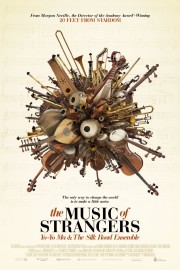The Music of Strangers
Although all of 2016 has had an air of dread and sadness loom over it with world events and “gone too soon” passings, the past couple of weeks have appeared to suck just a little harder than the rest. An artistic pick-me-up has been in order, and most recent movies haven’t delivered it. Now, out of seemingly nowhere for me, comes Morgan Neville’s follow-up to his wonderful musical documentary, “20 Feet From Stardom,” in “The Music of Strangers.” Rather than the backup singers that have been responsible for some of the most memorable moments in pop and rock n’ roll history, “Strangers” looks at a project that was the unusual brainchild of world-renowned cellist, Yo-Yo Ma, and how it helps people not only embrace their roots, but transcend them by working together to break boundaries between musical traditions to create something truly unique. The Silk Road Ensemble isn’t just a fusion of musical talents and backgrounds, but also a way for the performers to do something meaningful reflecting who they are, and what circumstances have led them to this moment. The stories of these musicians would be enough to make this a great documentary; when you take into consideration the music we hear throughout, the film becomes something unforgettable to experience.
In 2000, Yo-Yo Ma decided to move in a new direction as an artist, and founded the Silk Road Ensemble, a classically-trained ensemble that includes the cellist, Iranian Keyhan Kalhor playing the kamancheh, Spain’s Cristina Pato on gaita (a bagpipe with Spanish origins), Syrian clarinetist Kinan Azmeh and China’s Wu Man playing the pipa, among many others. All were well-known in their homelands, but it’s what happens when their talents combine that makes musical magic. One of my most exciting musical discoveries was the modern classical ensemble Kronos Quartet, which does both contemporary music as well as classical music, and is imaginative in it’s handling of both. With the Silk Road Ensemble, Yo-Yo Ma is searching through combining various musical styles to create a distinctive sound that breaks down barriers between cultures to point to all of us as from the same world, even if our heritages are completely different. As Wu Man says near the end, “There’s no East or West. There’s just a globe.” When you look closer at the histories that have shaped the main members of Silk Road, which include cultural revolution (in Man’s China), cultural repression and political revolution (in Kalhor’s Iran), and civil war (in Azmeh’s Syria), you find a rich tapestry of world experience for these artists to tap into, and allow to infuse their God-given musical ability while also making the world a better place.
There’s a part of me that wishes this were just a simple concert film, but the fact is, the context of who these musicians are at their core, and how that inspires their journeys from a musical and human perspective, is essential to the film. All five main performers have great individual moments (a glimpse of a younger Yo-Yo Ma playing a favorite piece of his on Mr. Rogers’s Neighborhood, and then later in concert, is probably the most emotionally affecting of his moments), but I don’t know that anybody really stood out as significantly as Kalhor and Pato. For Pato, her exuberance in her playing the gaita, a homegrown tradition in the spanish town she’s from, doesn’t really fit in with the traditional performances the town associates with the instrument, but there’s a singular energy to her that elevates the ensemble, and really takes it to another level, and that comes from Christina’s love of her family and life, in general, even with something as painful as her mother’s memory loss. I keep coming back to Kalhor, however, and how he was forced into leaving Iran around the time of the 2009 revolution, and when he did come back, he was forced to cancel shows due to what the government called “security concerns.” He never wanted to leave his home, though, and he and his wife had plans for how they would help infuse music into their homeland again. By the time of his return, however, his family had died in bombings, and his wife and he are forced into meeting in Jordan because it is not safe for him. There are moments when it is him alone on the kamencheh, or dueting with Yo-Yo Ma, that are emotionally devastating to watch, and some of the most profound moments in the film. The world feels like it’s in a worse-than-usual place right now, one where a unifying voice like the Silk Road Ensemble, with it’s varied backgrounds and singular purpose, can bring hearts and minds together. I, for one, am grateful Neville was able to bring them to me through his terrific film- I couldn’t have asked for anything better.










